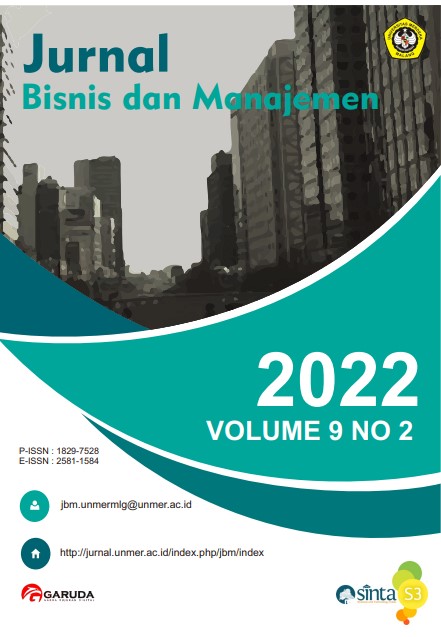Investigating Work Value, Job Satisfaction and Organizational Commitment Among National Electric Company Employees
DOI:
https://doi.org/10.26905/jbm.v9i2.7882Keywords:
employee’s performance, job satisfaction, organizational commitment, work value.Abstract
The purpose of this study was to examine the factors that influence organizational commitment, namely work value and job satisfaction. The research was conducted at the State Electricity Company (PT PLN) in the West Java region, using quantitative methods with a regression approach (path analysis) and using quantitative data (from questionnaires). Research respondents consisted of 210 permanent employees. In general, this study aims to determine the efforts that can be made to increase employee commitment to the organization. The results show that there is a positive influence of work value on job satisfaction, there is a positive influence of work value on organizational commitment, there is a positive influence of job satisfaction on organizational commitment, there is a positive influence of work value on organizational commitment through job satisfaction. the most influential on work value, the job itself factor is the most influential on job satisfaction and normative commitment factor is the most influential on organizational commitment. This study proposes several recommendations to employees at the State Electricity Company Ltd (PT PLN). Improve indicators that have a high contribution to commitment to the organization. With the improvement of these indicators, it can be predicted that it will increase employee commitment to the organization
Downloads
References
Ahmad, H., Ahmad, K., & Shah, L. A. (2010). Relationship between job satisfaction, job performance, attitude towards works and organizational commitment. Euro-pean Journal of Social Science, 8(2), 257–267.
Allen, N. J. & Grisaffe, D. B. (2001). Employee’s Commitment to The Organization and Customer Reactions Mapping The Linkkages. Human Resources Management Review; 11 209-239 ISSN 1053-4822.
Al-Marri, M.T., Majid. A, H.& Hilman, H. (2018) Examining the Effects of Work Values on Employee Commitment in UAE via Literature Survey. International Journal of Advances in Management and Economics; 60-89. ISSN: 2278-3369.
Arsenal, N.J., Rama, D.D., Tabigue, T.F., Mae R.C. & Narciso (2021). Intrinsic and Extrinsic Work Values and Organizational Commitment Among Employees of Um Tagum College. International Journal of Entrepreneurship and Business Development; 04 (04), 447-451. ISSN: 2597-4785
Bakhshi A, Kumar K, Rani. E. (2009). Organizational justice perceptions as predictor of job satisfaction and organizational commitment. International Journal of Business and Management; 4(9), 145-154.
Carrier, M.B., Ratelle, C.F. & Corff, Y.L. (2021) Work Values and Job Satisfaction: The Mediating Role of Basic Psychological Needs at Work. Journal of Career Development; (0) 1–16. DOI: 10.1177/08948453211043878
Colquitt, J. A., (2015). Organizational Behavior Improving Performance and Commitment in The Workplace. New York: Mc. Graw Hill.
Ćulibrk, J., Delić, M., Mitrović, S., & Ćulibrk, D. (2018). Job Satisfaction, Organizational Commitment and Job Involvement: The Mediating Role of Job Involvement.
Front Psychol.; 9 (132), 1-12. doi: 10.3389/fpsyg.2018.00132
Eliyana, A., Maarif, S. & Muzzaki (2019). Job Satisfaction and Organizational Commitment Effect in The Transformational Leadership toward Employee Performance. European Research of Management and Business Economics; (25), 144-150.
Froese, F.J. & Xiao, S. (2012). Work values, job satisfaction and organizational commitment in China.The International Journal of Human Resource Management; 23 (10), 2144–2162 http://dx.doi.org/10.1080/09585192.2011.610342.
Garson, D. (2003). Path Analysis. North Carolina State University.
Greenberg, J. & Baron, R. A. (1995). Behavior in Organizations: Understanding & Managing the Human Side of Work.Prentice Hall International edition. 5th Ed. ISBN: 0133249301 9780133249309.
Hettiarachchi, H. A. H., & Jayaeathua, S. M. D. Y. (2014). The effect of employer workrelated attitudes on employee job performance: A study of tertiary and voca-tional education sector in Sri Lanka. Journal of Business and Management, 16(4),74–83.
Hitlin, S. & Piliavin, J.A. (2004). Values: reviving a dormant concept. Annual Review of Sociology; 30 (1), 359-393.
Ingarianti, T.M. (2018). The Relationship between Work Value and Organizational Commitment on Student of Sekolah Polisi Negara Mojokerto. Advances in Social Science, Education and Humanities Research; 133 (62), 62-66.
Judge, T.A. & Bretz, R.D. (1992). Effects of work values on job choice decisions. Journal of Applied Psychology; 77 (3), 261-271.
Karim, F. & Rehman, O. (2012). Impact of Job Satisfaction, Perceived Organizational Justice and Employee Empowerment on Organizational Commitment in Semi-Government Organizations of Pakistan. Journal of Business Studies Quarterly; 3 (4), 92-104. ISSN 2152-1034
Latham, G.P. & Pinder, C.C. (2005). Work motivation theory and research at the dawn of the twenty-first century. Annual Review of Psychology; 56 (1), 485-516.
Mayer, R.C. & Davis, J.H. (1999). The effect of the performance appraisal system on trust for management: a field quasi-experiment. Journal of Applied Psychology; 84, 123-136.
Meyer, J. P. & Herscovitch, L. (2001). Commitment in the workplace toward a general model. Human Resource Management Review; 11 299-326.
Meyer, P. J., & Allen, J. N. (1984). Testing the side-bet theory of organizational commitment: Some methodological considerations. Journal of Applied Psychology; 69, 372−378.
Meyer, J. P., & Allen, N. J. (1991). A three-component conceptualization of organizational commitment. Human Resource Management Review; 1, 64–89.
Najafi, S., Noruzy, A., Azar, H. K., Nazari- Shirkouhi, S., & Dalvand, M. R. (2011). Investigating the relationship between organizational justice, psychological empowerment, job satisfaction, organizational commitment and organizational.
Niazi, A. & Ali, M. (2014). The Relationship between Organizational Justice and Organizational Commitment and the Mediating Effect of Job Satisfaction on Organizational Behavior International Journal of Management Sciences and Business Research; 2, 25-31. ISSN 2226-8235.
Rinehart & Short (1993). Job Satisfaction and Empowerment Among Teachers. ERIC, ED3622940.
Roe, R.A. & Ester, P. (1999). Values and work: empirical findings and theoretical perspective. Applied Psychology an International Review; 48, 1-21.
Rogers, J.D., Clow, K.E., & Kash, T.J (1994). Increasing Job Satisfaction Service of Personel. Journal of Services Marketing; 8 (1), 16-24.
Rokhman, W. (2013). Pengaruh Quality of Work Life terhadap Kepuasan Kerja, Komitmen Organisasi, Turn over Intention dan Stress Kerja (Studi Kasus pada BMT Kudus). Jurnal Equilibrium; 1, 200-216.
Schwartz, S.H. (1999). A theory of cultural values and some implications for work. Applied Psychology; 48 (1), 23-47.
Shahab, M. A., & Nisa, I. (2014). The influence of leadership and work attitudes towardjob satisfaction and performance of employee. International Journal of ManagerialStudies and Research (IJMSR), 2(5), 69–77.
Shah, F.T., Idrees, F., Imam, A., Khan, T., A. & Mariyam, A. (204). Impact of Job Satisfaction on Organizational Commitment in IT Sector Employees of Pakistan. Journal of Applied Environmental and Biological Sciences; 4(8)190-197. ISSN: 2090-4274
Siswanto, Setiani & Syakur. A. (2019). The Influence of Islamic Work Ethic and Job Satisfaction on Organizational Commitment: Islamic Educational Institution Evidence. Etikonomi; 18 (1), 73 – 82. P-ISSN: 1412-8969; E-ISSN: 2461-0771
Super, D.E. (1970), Work Values Inventory, Houghton Mifflin Cm, Boston, MA.
Zeinabadi, H. (2010). Job satisfaction and organizational commitment as antecedents of Organizational Citizenship Behavior (OCB) of teachers. Procedia Social and Behavioral Sciences; 5. 998–1003.
Downloads
Additional Files
Published
How to Cite
Issue
Section
License
Authors who publish with this journal agree to the following terms:
(1) Copyright of the published articles will be transferred to the journal as the publisher of the manuscripts. Therefore, the author confirms that the copyright has been managed by the journal.
(2) Publisher of Jurnal Bisnis dan Manajemen is University of Merdeka Malang.
(3) The copyright follows Creative Commons Attribution–ShareAlike License (CC BY SA): This license allows to Share — copy and redistribute the material in any medium or format, Adapt — remix, transform, and build upon the material, for any purpose, even commercially.














